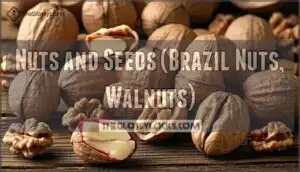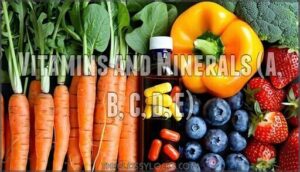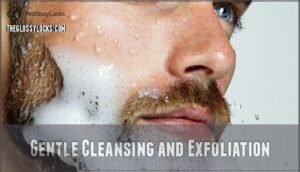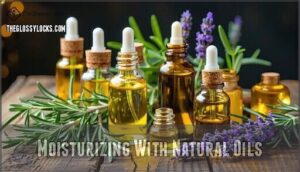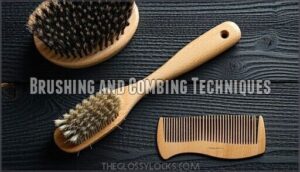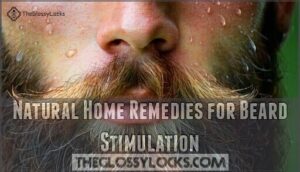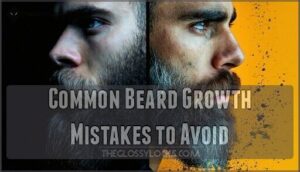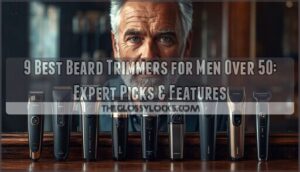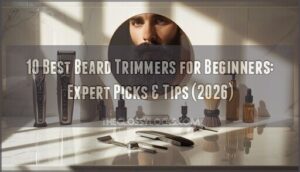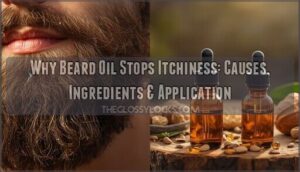This site is supported by our readers. We may earn a commission, at no cost to you, if you purchase through links.
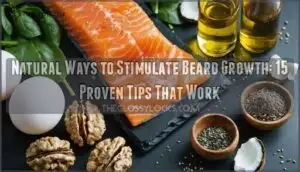
Apply natural oils like castor and coconut oil to nourish skin and awaken dormant follicles. Regular beard massage increases blood circulation, while gentle cleansing prevents blocked pores.
Manage stress through exercise and quality sleep to balance testosterone levels. These foundational strategies create the ideal environment for your facial hair to thrive, but there’s more to the science behind maximizing your genetic potential.
Table Of Contents
- Key Takeaways
- Key Factors Affecting Beard Growth
- Best Foods for Natural Beard Growth
- Essential Beard Care Habits
- Natural Home Remedies for Beard Stimulation
- Lifestyle Changes to Boost Beard Growth
- Common Beard Growth Mistakes to Avoid
- Frequently Asked Questions (FAQs)
- How can I make my beard hair grow faster?
- How do you get a beard to grow a full beard?
- How can I make my beard grow thicker?
- How can a beard grow & look better?
- What foods help a beard grow faster?
- What is the best way to grow beard faster?
- Is there a way to stimulate your body to grow beard fast?
- Why is my beard growing slowly?
- How long do I have to wait to achieve full beard growth?
- Does trimming help grow beard fast?
- Conclusion
Key Takeaways
- Eat protein-rich foods like meat, fish, eggs, leafy greens, and nuts to give your beard the nutrients it needs to grow strong.
- Apply natural oils such as castor and coconut oil, and massage your beard regularly to boost blood flow and awaken dormant follicles.
- Manage stress through exercise and quality sleep to keep your testosterone levels balanced and support healthy beard growth.
- Stick to a consistent beard care routine—cleanse, moisturize, and brush daily to prevent clogged pores and patchy growth.
Key Factors Affecting Beard Growth
Your beard’s potential depends on three main factors you can’t completely control but can influence. Understanding genetics, hormones, and lifestyle gives you the best shot at maximizing what nature gave you.
Genetics and Age
Understanding your genetic blueprint is like reading your beard’s future. **Your family history reveals vital clues about beard density and growth patterns.
** Genetics control approximately 80% of your hair follicle development, determining when testosterone activates dormant follicles.
Age factors heavily influence beard growth stages, with peak density usually reached between your late twenties and early thirties through natural hormonal balance.
Hormone Levels (Testosterone, DHT)
Your testosterone levels act like the engine powering your beard growth. When testosterone converts to DHT through the 5-alpha reductase enzyme, it binds to follicle receptors and transforms wispy vellus hairs into thick terminal beard hairs.
- Testosterone therapy: Medical supervision required for hormone levels below 300 ng/dL
- DHT blockers: Can reduce scalp hair loss but may limit facial hair growth
- Cortisol management: High stress hormones decrease testosterone by up to 25%
Lifestyle and Environmental Influences
Beyond genetics and hormones, your environment and daily habits shape beard growth substantially. Urban lifestyle factors like air pollution and poor water quality can damage hair follicles, while environmental toxins disrupt hormone production.
Your diet, exercise routine, and sleep quality directly impact testosterone levels. Managing stress levels prevents cortisol from blocking growth, and quitting smoking improves blood flow to follicles.
Understanding the role of beard growth phases is essential for optimizing your beard care routine and promoting healthy growth.
Best Foods for Natural Beard Growth
What you eat directly affects your beard’s ability to grow thick and strong. The right nutrients provide the building blocks your hair follicles need to produce healthy facial hair consistently.
Protein-Rich Foods (Meat, Fish, Eggs)
Your beard needs building blocks to grow strong and thick. Protein from meat, fish, and eggs provides amino acids that fuel protein synthesis in hair follicles. These protein sources contain beard growth vitamins and minerals that prevent nutritional deficiencies affecting healthy beard growth. Additionally, a diet rich in omega-3 fatty acids, often found in fish oil supplements, can promote healthy hair growth.
Strong beards start with the right fuel—protein builds the foundation your follicles crave
- Salmon and mackerel: Rich in fish oil and omega-3s for follicle health
- Lean beef and chicken: High-quality meat benefits include zinc and iron
- Egg nutrition: Complete protein plus biotin for stronger hair strands
Leafy Greens and Vegetables
Leafy greens pack vitamins A, C, and E—essential beard growth vitamins that fuel healthy hair growth. Spinach benefits include iron and folate, while kale nutrition offers biotin for stronger follicles.
Blend these beard growth foods into green smoothies or try beetroot juice for circulation. Simple vegetable recipes make incorporating leafy greens easy and delicious.
Nuts and Seeds (Brazil Nuts, Walnuts)
Your protein needs are just the beginning—nuts and seeds pack beard growth vitamins that support healthy hair growth naturally. Brazil nuts deliver selenium for strong follicles, while walnuts provide omega-3 fatty acids.
These nutrient-dense foods offer seed oil benefits that nourish your facial hair from within. Smart seed consumption tips: eat a handful daily for natural hair growth support.
Vitamins and Minerals (A, B, C, D, E)
While nuts provide protein, vitamins and minerals form the backbone of healthy hair follicles. Vitamin deficiency can seriously impact beard growth, making dietary balance critical for ideal results.
Key beard growth vitamins your follicles crave:
- Vitamin A – Powers sebum production, keeping follicles moisturized and protected from damage
- B vitamins – Biotin strengthens hair shafts while B12 fuels cellular energy in rapidly dividing cells
- Vitamin C – Builds collagen for stronger hair structure and fights follicle-damaging free radicals
- Vitamin D – Activates dormant follicles and regulates healthy hair cycling patterns
- Vitamin E – Reduces inflammation and boosts blood circulation to nourish beard nutrition pathways
Mineral supplements can fill gaps, but whole foods provide better absorption rates for sustained growth. Understanding the role of beard growth vitamins is essential for creating an effective dietary plan to support healthy beard development.
Essential Beard Care Habits
Your beard care routine can make the difference between patchy growth and a full, healthy beard.
Proper cleansing, moisturizing, and brushing techniques create the ideal environment for your facial hair to thrive naturally.
Gentle Cleansing and Exfoliation
Since healthy skin creates the foundation for strong beard growth, you’ll want to establish a proper facial skincare routine. Clean your skin twice daily with natural soap that won’t strip away essential oils. Use gentle exfoliants weekly to remove dead skin cells and promote beard follicle stimulation through improved circulation.
| Cleansing Method | Frequency | Benefits |
|---|---|---|
| Natural soap washing | Daily (morning/evening) | Removes dirt without over-drying |
| Gentle face scrub | 2-3 times per week | Unclogs pores, stimulates follicles |
| Warm water rinse | After each wash | Opens pores, improves circulation |
| Pat dry technique | After cleansing | Prevents skin irritation |
| Pre-shave preparation | Before trimming | Softens hair, reduces ingrown hairs |
Moisturizing With Natural Oils
Your beard thrives when you moisturize with natural oils that support skin hydration and beard nourishment. These natural moisturizers create the perfect foundation for healthy facial care routines.
Essential oils for ideal beard growth:
- Castor oil – Promotes circulation and strengthens follicles
- Coconut oil – Provides deep moisturizing and antimicrobial protection
- Jojoba oil – Mimics natural sebum for balanced hydration
- Argan oil – Rich in vitamins that support the beard growth cycle
Using beard growth products can boost the effectiveness of these natural oils. Apply these oils after cleansing to lock in moisture and create an environment where your beard can flourish naturally.
Brushing and Combing Techniques
Regular brushing stimulates blood circulation around hair follicles, promoting healthier beard growth. Use a quality beard brush with natural bristles for gentle strokes that distribute oils evenly.
A beard comb helps with detangling tips—start from the bottom and work upward. Choose comb styles that match your facial hair length.
Proper beard care through consistent brushing prevents ingrown hairs and maintains follicle health.
Natural Home Remedies for Beard Stimulation
You can stimulate dormant hair follicles using simple home remedies that work with your body’s natural growth processes. These methods increase blood flow to your facial hair follicles and provide essential nutrients directly to the skin.
Castor and Coconut Oil Application
Applying these oils strategically can release powerful follicle stimulation benefits. Castor oil contains ricinoleic acid, which boosts blood circulation to hair follicles and promotes natural remedies for stronger beard growth. Coconut oil provides deep skin nourishment, preventing dryness that hinders facial hair growth.
Together, these oil benefits create ideal conditions for beard hair growth while supporting thorough beard care routines. Understanding the castor oil benefits is essential for maximizing its effects on beard growth.
Beard Massage Methods
Massage techniques boost circulation around hair follicles, potentially improving beard growth. **Use gentle circular motions with your fingertips across your jawline and cheeks for five minutes daily.
** This facial massage increases blood flow to dormant follicles.
Scalp rolling techniques work well too – pinch skin gently between fingers and roll upward. **Regular massage therapy sessions promote beard stimulation naturally.
Benefits of Microneedling
Microneedling therapy creates controlled micro-injuries that activate dormant hair follicle growth through enhanced skin stimulation. This facial rejuvenation technique boosts collagen production, improving your beard’s foundation while increasing blood flow to follicles for beard improvement. The procedure is minimally invasive and can help with overall beard growth.
Key microneedling benefits for beard hair growth:
- Awakens sleeping follicles – Up to 82% of users see 50%+ improvement in hair growth
- Thickens existing beard hair – Studies show 91.4 vs.
22.2 hairs per cm² in 12 weeks
- Reduces patchy areas – Fills sparse spots within 4-6 weeks of consistent use
- Amplifies topical treatments – Increases minoxidil absorption dramatically
- Stimulates natural collagen – Creates healthier skin environment for vigorous growth
Lifestyle Changes to Boost Beard Growth
Your daily habits play a bigger role in beard growth than you might think. Simple lifestyle changes can naturally boost your body’s ability to grow thicker, healthier facial hair by optimizing hormone levels and improving blood flow to hair follicles.
Managing Stress Levels
When chronic stress disrupts your hormonal balance, it triggers elevated cortisol levels that directly suppress testosterone production, hindering facial hair growth. Mindfulness practices like meditation and deep breathing exercises can help manage stress levels. These relaxation techniques reduce stress hormones while supporting mental wellbeing, creating ideal conditions for beard growth and improved testosterone production.
Establishing consistent bedtime routines, which help boost growth hormone, can also improve beard growth.
Regular Exercise and Sleep Quality
Regular exercise acts like a natural testosterone factory for your body. When you lift weights or do cardio, you’re basically telling your system to ramp up testosterone production and growth hormones.
Better circulation benefits deliver more nutrients to your facial hair follicles.
Quality sleep optimization is equally important—your body produces most testosterone during deep sleep phases. Poor sleep tanks your hormone levels faster than you’d think.
Quitting Smoking for Beard Health
Smoking damages blood vessels and reduces circulation to facial hair follicles through nicotine effects and smoking inflammation. This blood vessel damage restricts nutrients needed for beard hair growth.
Quitting smoking can reverse these harmful effects, improving lung health and facial hair growth. Your beard growth may gradually improve as circulation returns to normal after stopping tobacco use.
Common Beard Growth Mistakes to Avoid
Even experienced beard growers make costly mistakes that can sabotage their growth goals. You might be unknowingly slowing your progress through common misconceptions about shaving, nutrition, or daily care habits.
Over-Shaving Myths
Contrary to popular belief, shaving won’t accelerate beard growth or increase hair thickness. This myth stems from stubble appearance—freshly cut hair feels coarser at the base, creating an illusion of increased follicle damage resistance.
Your growth rate remains genetically predetermined regardless of shaving frequency. Over-shaving can actually irritate skin and potentially harm follicles, hindering natural facial hair growth rather than encouraging it.
Poor Diet Choices
Your diet can make or break your beard growth journey. Poor food choices create hormonal chaos that stunts facial hair development. Here are four dietary mistakes sabotaging your beard:
- Processed Foods – High sugar and trans fats spike insulin, reducing testosterone by 15% and disrupting DHT production
- Nutrient Deficiencies – Missing iron, zinc, biotin, and vitamin D weakens follicles and slows keratin synthesis
- Excessive Sugar Intake – Sweet drinks double low testosterone odds, triggering insulin surges that suppress hormone production
- Heavy Alcohol Consumption – Beyond moderate intake, alcohol decimates testosterone levels by 100% and impairs nutrient delivery to follicles
Skip fad diets that eliminate entire food groups. Instead, embrace a balanced diet rich in protein, healthy fats, and beard growth vitamins. A balanced diet should include foods high in omega-3 fatty acids to promote healthy skin and hair.
To further support beard growth, consider adopting healthy lifestyle habits that can positively influence facial hair development. Your facial hair needs steady fuel, not dietary roller coasters that leave follicles gasping for nutrients.
Inconsistent Beard Care Routine
Skipping your beard care routine creates a chaotic cycle that sabotages growth potential. Without consistent Beard maintenance, your facial hair suffers from product buildup, clogged follicles, and poor circulation.
Daily Beard oil application and proper cleansing prevent Patchy Beard Fixes later. Routine Time Management beats sporadic efforts every time for healthier results.
Frequently Asked Questions (FAQs)
How can I make my beard hair grow faster?
Just as athletes hit growth spurts when conditions align perfectly, your beard thrives with proper nutrition, sleep, and stress management.
Eat protein-rich foods, get quality rest, maintain clean skin, and consider biotin supplements for ideal follicle health.
How do you get a beard to grow a full beard?
You’ll need patience, proper nutrition, and good habits. Eat protein-rich foods, take biotin supplements, get adequate sleep, exercise regularly, and maintain clean skin. Genetics ultimately determine your beard’s fullness potential.
How can I make my beard grow thicker?
Eat protein-rich foods, take biotin supplements, exercise regularly to boost testosterone, get quality sleep, quit smoking, moisturize with natural oils, and consider microneedling to increase blood flow to follicles.
How can a beard grow & look better?
Focus on proper nutrition, quality sleep, regular exercise, and gentle skin care. Eat protein-rich foods, take biotin supplements, moisturize with natural oils, and maintain consistent grooming habits for healthy growth.
What foods help a beard grow faster?
You’ll want foods loaded with protein, biotin, and vitamins like eggs, fish, nuts, spinach, and sweet potatoes. These boost hair strength and growth.
It’s not magic, but your beard might thank you with thicker whiskers.
What is the best way to grow beard faster?
Growing a beard is like planting seeds—genetics set the soil, but you can water it with a protein-rich diet, good sleep, and regular exercise.
Keep your skin clean, moisturized, and stress low for best results.
Is there a way to stimulate your body to grow beard fast?
You can’t rush beard growth like baking a cake, but boosting your testosterone with regular exercise, eating protein-rich foods, and sleeping well helps.
Keep your skin clean and moisturized—think of it as prepping fertile soil for sprouts.
Why is my beard growing slowly?
Did you know about 45% of men experience patchy or slow beard growth? Your genes, age, and hormone levels call the shots.
Poor sleep, stress, or a not-so-great diet can also keep your beard in slow motion.
How long do I have to wait to achieve full beard growth?
You might wait anywhere from several months to a few years for full beard growth. Genetics, age, and hormones set the pace.
Don’t stress—think of it like waiting for a good sourdough to rise.
Does trimming help grow beard fast?
Like a medieval knight sharpening his sword, trimming your beard won’t make it grow faster, but it keeps split ends at bay. You’ll get a neater look, and healthy hair has a better shot at thriving.
Conclusion
Growing a beard mightn’t turn you into a superhero overnight, but natural ways to stimulate beard growth can make a real difference. Genetics play a big role, so results vary. Stay patient and consistent—think of your beard as a science experiment that takes time.
If you eat well, use oils, and care for your skin, you set the stage for stronger, fuller hair. Skip the myths, follow the facts, and watch your progress.



